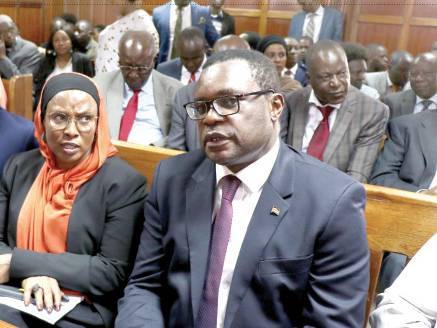Blow to senators after court blocks Sh1b kitty access
By Nancy.Gitonga, February 18, 2022Senators yesterday suffered a major blow after the Supreme Court denied them access to Sh1 billion kitty for oversight of county projects.
This is after the Supreme Court Bench headed by Chief Justice Martha Koome upheld a decision that declared the County Government Amendment Act of 2014 enacted by the National Assembly in consultation with the Senate to be unconstitutional, null and void.
The decision arose from an appeal filed by the Senate, National Assembly and 47 Senators seeking to overturn a decision by the Court of Appeal and the High Court that declared the act to allow the access to the county functions unlawful.
The legislators had pushed for the money since July 24, 2014 when they enacted the County Government Amendment Act (CGAA) bill Number 2 and received Presidential assent on July 30, 2014.
While dismissing the appeal, Justices Koome, Mohammed Ibrahim, Smokin Wanjala, William Ouko and Njoki Ndung’u in their judgment stated the senators cannot oversight the county governments at the county level as the role is reserved for the County Assembly.
“They cannot be involved in the co-coordination of programmes that are purely county programmes, or county project approvals or actual implementation of county projects as these are county executive functions.
It is equally untenable for Senators, who oversight county resources from the national government, to convene and chair county committees,” the judges ruled.
The lawmakers amended the County Government Act by introducing a new section 91A which establishes the County Development Boards (CDBs) in each of the 47 counties in Kenya. The bill also introduced 91B and 91C.
These amendments provide for the establishment of the CDBs, their composition, and sources of funds, and creates an offence for obstructing the functions of the CDBs.
The CDBs were to comprise namely, members of the National Assembly representing constituencies within respective counties, members of county assemblies, as well as members of the executive operating within respective counties, and were to be chaired by the Senator from the county.
The Act placed the coordination and harmonisation role of county development plans and projects within the ambit of the CDBs.
According to the Memorandum of Objects and reasons for the CGAA also indicated that the Act intended to provide CDBs with the power to consider and adopt county integrated development plans and county annual budgets before they are tabled in the County Assemblies for approval.
Following the enactment of the CGAA and the establishment of the CDBs, the Council of Governors, a body comprising all the Governors of the 47 counties, lodged suit in court challenging the constitutionality of the CDBs.
Others who had challenged the CGAA were County Speakers of the 47 counties, Attorney General, the Commission for the Implementation of the Constitution, Katiba Institute and four other individuals.
Allocation of functions
They alleged that the provisions of the CGAA grant powers to state organs in conflict with the allocation of functions in the Constitution. Council of Governors (CoG) on it’s part asked the Court to declare the provisions of Section 91A of the CGAA, which vests various functions in the CDBs, unconstitutional for violating Articles 6(2); 95, 96, 174(1), 175, 179(1), 179(4), 183(1), 185(3) and 189(1) of the Constitution.
The basis of the challenge is that through the CDBs, Senators and members of the National and County Assemblies would be undertaking executive functions at the County level.
Council of Governors had submitted that Articles 179(1) and (2) vest the executive power of county governments in the county executive committee.
“Article 6(2) provides that government at national and county level are distinct and inter-dependent. Its contention is that Senators are members of the national parliament which is vested with legislative authority in terms of Article 94 of the Constitution, and they have no role to play at county level,” the Council of Governors informed the court.
It is its contention further that as the CGAA provides powers, other than legislative powers, to Senators, which powers are outside the realm of national government, it is unconstitutional.
“With regard to devolution, the CGAA is an affront to devolution which, in terms of Article 174 has, as its aims, to promote democratic and accountable exercise of power, and to foster national unity by recognising diversity,” they argued.
They further argued that the Constitution does not contemplate members of the Senate and National Assembly would micro manage planning and budgeting in the counties; therefore, by giving Senators and Members of the National Assembly coordination and implementation roles in the county governments, section 91A of the CGAA violates the Constitution.
